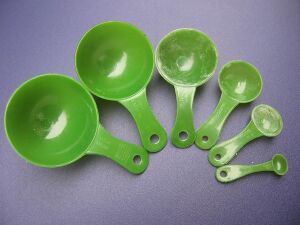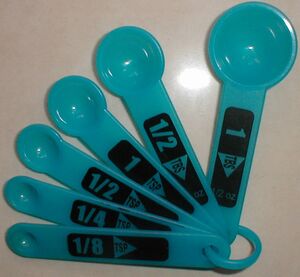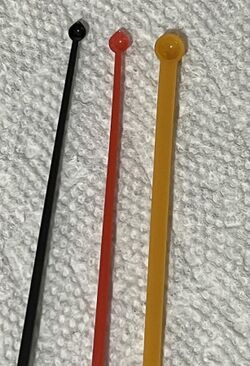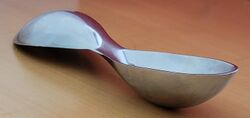Measuring spoon
Topic: Physics
 From HandWiki - Reading time: 3 min
From HandWiki - Reading time: 3 min



A measuring spoon is a spoon used to measure an amount of an ingredient, either liquid or dry, when cooking. Measuring spoons may be made of plastic, metal, and other materials. They are available in many sizes, including the teaspoon and tablespoon.
Country differences
International
Metric measuring spoons are available in sets, usually between four and six, typically with decilitre (100 ml), tablespoon (15 ml), teaspoon (5 ml) and millilitre measures.[citation needed] For fractional measures, there is often a line inside to indicate "half" or "a quarter", or a separate measure may be included, like 1⁄2 dl.
United States
In the U.S., measuring spoons often come in sets, usually between four and six. This usually includes ¼, ½, and 1 teaspoon and 1 tablespoon.[1] The volume of a traditional US teaspoon is 4.9 ml and that of a tablespoon is 14.8 ml, only slightly less than standard metric measuring spoons.
Japan
In Japan, usually two spoons are used: a large spoon (大さじ Ōsaji) and a small spoon (小さじ Kosaji or Shōsaji). A large spoon is 15 milliliters, and a small spoon is 5 milliliters. Sometimes a much smaller spoon may be used, usually a 2.5 milliliter spoon (½ small spoon).
Australia
The Australian definition of the tablespoon as a unit of volume is larger than most:[citation needed]
Specialized measuring spoons

Special spoons are manufactured to measure popular materials for common tasks. For example, for coffee the standard measuring spoon contains 7 grams of coffee powder, adequate for an espresso.[2]
Measuring with cutlery spoons
Cutlery in many countries includes two spoons (besides the fork and knife, or butterknife). These cutlery spoons are also called a "teaspoon" and "tablespoon", but are not necessarily the same volume as measuring spoons with the same names: Cutlery spoons are not made to standard sizes and may hold 2.5~7.3 ml (50%~146% of 5 ml) for teaspoons[3] and 7~20 ml (47%~133% of 15 ml) for tablespoons. The difference in size can be dangerous when cutlery is used for critical measurements, like medication.
See also
- Measuring cup
- Cooking weights and measures
- Kitchen utensil
References
- ↑ Roupe, Diane (26 Oct 2009). The Blue Ribbon Country Cookbook. Thomas Nelson Inc. p. 36. ISBN 9781418568214. https://books.google.com/books?id=Yr0z5YPQbU0C.
- ↑ Markus J. M. Bihler (1998). Espresso Cappuccino & Co. CIRCUS imaging ARTists. p. 39. ISBN 978-3-9803028-2-1. OCLC 49195065. https://books.google.com/books?id=un4EQqqF5R4C.
- ↑ "Spoons give wrong medicine doses". NHS UK (Press release). 15 July 2010. Retrieved 21 February 2020.
 |
 KSF
KSF